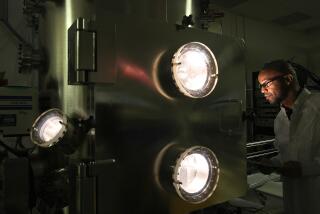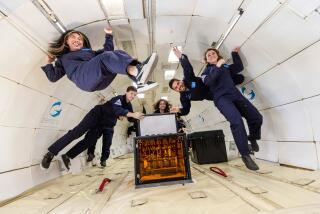U.S., Russian Space Experts Rendezvous at O.C. Facility
HUNTINGTON BEACH — At an aerospace facility that once fiercely guarded its secrets from the Soviet Union, 15 Russian engineers are working with Americans to share information on space exploration.
Far from the tumultuous events in Moscow, McDonnell Douglas Aerospace in Huntington Beach opened a unique technology center Tuesday where scientists, many of them from the Russian Academy of Sciences, will pool their nations’ expertise and help forge a unified focus on space exploration.
Rivals during the Cold War, the U.S. and Russian scientists will work side by side at the new center. “Engineers and scientists around the world are pretty much the same,” said David Wensley, head of the U.S. program and vice president of Advanced Products and Technology at McDonnell Douglas Aerospace. “We like to solve difficult problems that challenge our skills.”
Located across Bolsa Avenue from the main McDonnell Douglas Aerospace building, the center on Tuesday was little more than a bare collection of workstations.
The Russian engineers will travel to Orange County from time to time to work in the new quarters. The frequency of their visits will depend on government approvals of individual projects, including the U.S.-Russian space station proposed by President Clinton, company officials said.
Most of them speak English, Wensley said, and have been heard to strike up conversations with their U.S. counterparts about everything from U.S. political figures to the novels of Ernest Hemingway.
For their part, McDonnell Douglas executives have begun taking Russian language lessons twice a week during lunchtime.
“If you have someone who is focused on the origin of the universe, on the unified theory of matter, you don’t much care about politics and economics,” Wensley said.
Even so, world events did not go unnoticed at the center on Tuesday as Russian President Boris Yeltsin and the Russian Parliament were locked in a constitutional crisis. Wensley said he was listening to the radio in his office when he heard about the trouble in Russia. His first thought was, he said, that “all this may be out the window.”
Despite the spirit of cooperation, such joint ventures could be in jeopardy, depending on what happens.
“You could have the Russian government wanting to reconsider all of these things,” said Patrick Morgan, director of the Global Peace and Conflict Studies Program at UC Irvine. “One of the complaints they have is that Yeltsin is too much in bed with the United States. If they took control, it would inhibit ventures like this.”
Morgan said that such joint efforts, however, are prized by most Russians, who see them as a way to increase their country’s presence in the United States. He said the venture may also help American politicians who are interested in promoting the joint Russian-U.S. space station as a way to keep the project alive.
McDonnell Douglas opened an office in Moscow last year, and about 20 Americans have traveled there to work and learn.
W.F. Bozich, staff director of the new Huntington Beach technology center, was one of the first to make the trip to Russia. He said the experience was “like opening a closet door and finding all things you haven’t seen before.”
The cooperation has already spawned a Rover, a vehicle intended for travel on distant planets. Two weeks ago, a McDonnell Douglas team in California controlled the movements of the Rover as it rolled across the plains of Kamchatka in Russia.
Other research projects at the new center include technology for single-stage-to-orbit vehicles, experiments on the Russian Mir space station and the development of technology for future space missions. Under study are projects that would use Russian technology to map the surface of the moon and McDonnell Douglas expertise to build a robotic arm for use during a Russian mission to Mars in 1996.
Based in St. Louis, parent company McDonnell Douglas Corp. would be a major subcontractor for President Clinton’s ambitious plan to collaborate with Russia on a space station. In a crucial vote Tuesday in Washington, the Senate approved funding to continue development of the station through next year.
The space station program is essential to the health of the Southern California aerospace industry, home to two of the project’s principal contractors: McDonnell Douglas and Rockwell International Corp.’s Rocketdyne Division in Canoga Park.
In August, both companies lost out to Boeing Co. in a bid to become the redesigned space station’s primary contractor. That has already cost 200 jobs at McDonnell Douglas in Huntington Beach.
* SPACE STATION: Senate endorses Clinton plan for U.S.-Russia orbiting lab. A3
More to Read
Sign up for Essential California
The most important California stories and recommendations in your inbox every morning.
You may occasionally receive promotional content from the Los Angeles Times.










